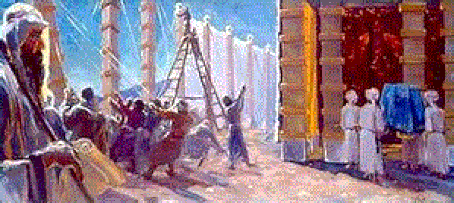ויאמר אלי הנבא על־העצמות האלה ואמרת אליהם העצמות היבשׁות שׁמעו דבר־יהוה׃
כה אמר אדני יהוה לעצמות האלה הנה אני מביא בכם רוח וחייתם׃
He [HaShem] asked me, "Human being, can these bones live?" I answered, "Adonai Elohim! Only you know that!" Then he said to me, "Prophesy over these bones! Say to them, 'Dry bones! Hear what Adonai has to say! To these bones Adonai Elohim says, "I will make breath enter you, and you will live. (Eze 37:3-5 CJB)
Whatever calendar one favors, the resurrection of the Master happens within the festival of Unleavened Bread. The ancient sages of Israel must have had some messianic insight of some sort to have chosen Ezekiel 37 as a aftara for the Shabbat that is in the feast of Unleavened bread as it pertains to the resurrection not just of the Master but of all Israel at the end of days.
Paul the emissary reminded his pupils that the Messiah has been raised from the dead, the firstfruits of those who have died. (1Co 15:20 CJB) Yeshua was the firstfruit. Look at what happened right when he died:
But Yeshua, again crying out in a loud voice, yielded up his spirit. At that moment the parokhet in the Temple was ripped in two from top to bottom; and there was an earthquake, with rocks splitting apart. Also the graves were opened, and the bodies of many holy people who had died were raised to life; and after Yeshua rose, they came out of the graves and went into the holy city, where many people saw them. (Mat 27:50-53 CJB)
DOUBTING THE IDEA OF RESURRECTION?
But if it has been proclaimed that the Messiah has been raised from the dead, how is it that some of you are saying there is no such thing as a resurrection of the dead?
If there is no resurrection of the dead, then the Messiah has not been raised; and if the Messiah has not been raised, then what we have proclaimed is in vain; also your trust is in vain; furthermore, we are shown up as false witnesses for God in having testified that God raised up the Messiah, whom he did not raise if it is true that the dead are not raised. For if the dead are not raised, then the Messiah has not been raised either; and if the Messiah has not been raised, your trust is useless, and you are still in your sins.
Also, if this is the case, those who died in union with the Messiah are lost. If it is only for this life that we have put our hope in the Messiah, we are more pitiable than anyone. But the fact is that the Messiah has been raised from the dead, the firstfruits of those who have died. For since death came through a man, also the resurrection of the dead has come through a man. For just as in connection with Adam all die, so in connection with the Messiah all will be made alive. But each in his own order: the Messiah is the firstfruits; then those who belong to the Messiah, at the time of his coming; then the culmination, when he hands over the Kingdom to God the Father, after having put an end to every rulership, yes, to every authority and power. (1Co 15:12-24 CJB)
But some people ask, "Oh no! Why do you say Yeshua was the firstfruit like if he were the first one to resurrect? Yeshua was not the first one. Elijah and Elisha also brought people back; even Yeshua did it with a child and with Lazarus!".
These were not resurrections. These could be considered resuscitations. These people will still die. At the resurrection of the dead, we will have bodies like that of Yeshua when He resurrected. Look at what it says here:
But he said to them, "Why are you so upset? Why are these doubts welling up inside you? Look at my hands and my feet -- it is I, myself! Touch me and see -- a ghost doesn't have flesh and bones, as you can see I do." (Luk 24:38-39 CJB)
No blood? Blood is what creates corruption. To conserve meat you take out the blood. The whole idea of clean and unclean/tahor and tamei is about corruption caused by blood.
THE DAY WE ARE WAITING FOR:
For if we have been united with him in a death like his, we will also be united with him in a resurrection like his. (Rom 6:5 CJB)
Many of those sleeping in the dust of the earth will awaken, some to everlasting life and some to everlasting shame and abhorrence. (Dan 12:2 CJB)
For the Lord himself will come down from heaven with a rousing cry, with a call from one of the ruling angels, and with God's shofar; those who died united with the Messiah will be the first to rise; then we who are left still alive will be caught up with them in the clouds to meet the Lord in the air; and thus we will always be with the Lord. (1Th 4:16-17 CJB)
I like to imagine the disciples every year remembering the resurrection event, "Oh ye;, that was the day when we saw him by the Sea of Galilee and ...!"
All the resurrected appearances of Yeshua happened during the counting of the Omer so I put together a little list of verses to read during that time that takes us to Shavuot. These are verses that tell about his resurrected appearances. That will help us to remember these events the way the disciples did.


 RSS Feed
RSS Feed